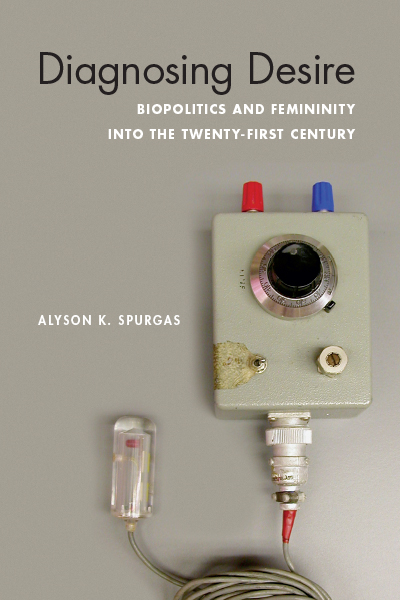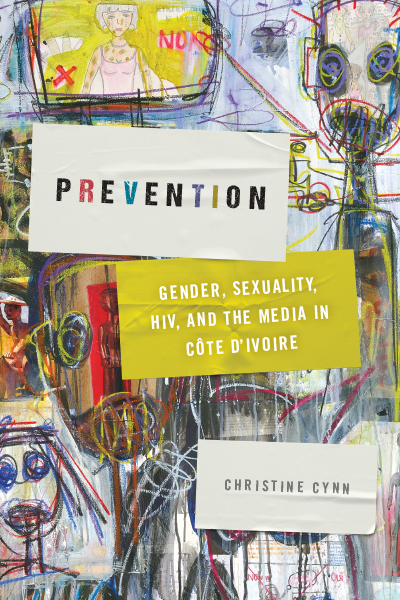Winner of the 2021 Cultural Studies Association First Book Prize
“Elegantly written … Spurgas’s book expands the cultural studies repertoire of sharp conjunctural analysis, specifying the role that neoliberalism, biopolitics, and conceptions of sex, gender, and whiteness play in rendering contemporary feminine sexuality.” —Judges’ citation, 2021 Cultural Studies Association First Book Prize
“Diagnosing Desire is a compelling feminist engagement with the science of sexuality. Nothing is spared in this powerful critique—from plethysmographs to mindfulness therapies, Spurgas identifies the governance technologies that render women’s sexuality unfathomable and that modulate their desires within a framework of receptivity. This book makes substantial and vital contributions to discussions of (feminized) trauma; power, gender, and sexuality; consent and coercion; and gendered labor and carework.” —Christine Labuski, author of It Hurts Down There: The Bodily Imaginaries of Female Genital Pain
“Diagnosing Desire is a very provocative, critical, and strongly argued book, which goes beyond a discussion of women’s sexual disorders to explore the anthropological, historical, and ontological dimensions of desire and gender.” —Alain Giami, editor of Sexual Revolutions
In Diagnosing Desire: Biopolitics and Femininity into the Twenty-First Century, Alyson K. Spurgas examines the “new science of female sexuality” from a critical, sociological perspective, considering how today’s feminist-identified sex researchers study and manage women with low desire. Diagnosing Desire investigates experimental sex research that measures the disconnect between subjective and genital female arousal, contemporary psychiatric diagnoses for low female desire, new models for understanding women’s sexual response, and cutting-edge treatments for low desire in women—including from the realms of mindfulness and alternative healing.
Spurgas makes the case that, together, all of these technologies create a “feminized responsive desire framework” for understanding women’s sexuality, and that this, in fact, produces women’s sexuality as a complex problem to be solved. The biggest problem, Spurgas argues, is that gendered and sexualized trauma—including as it is produced within technoscientific medicine itself—is too often ignored in contemporary renderings. Through incisive textual analysis and in-depth qualitative research based on interviews with women with low desire, Spurgas argues for a more radical and communal form of care for feminized—and traumatized—populations, in opposition to biopolitical mandates to individualize and neoliberalize forms of self-care. Ultimately, this is a book not just about a specific diagnosis or dysfunction but about the material-discursive regimes that produce and regulate femininity.
 Alyson K. Spurgas is Assistant Professor of Sociology at Trinity College in Hartford, Connecticut.
Alyson K. Spurgas is Assistant Professor of Sociology at Trinity College in Hartford, Connecticut.
Author photo: Christian Rutledge
Contents
Acknowledgments
Introduction Diagnosing Gender through Desire: How You Know You’re in Bed with a Woman
Chapter 1 Sexual Difference and Femininity in Sex Therapy and Sex Research: Examples from the Nineteenth, Twentieth, and Twenty-First Centuries
Chapter 2 Interest, Arousal, and Motivation in Contemporary Sexology: The Feminization of Responsive Desire
Chapter 3 Women-with-Low-Desire: Navigating and Negotiating Sexual Difference Socialization
Chapter 4 Embodied Invisible Labor, Sexual Carework: The Cultural Logic and Affective Valorization of Responsive Female Desire
Chapter 5 Reclaiming Receptivity: Parasexual Pleasure in the Face of Compulsory and Feminized Trauma
Conclusion The Freedom to Fall Apart: Feminine Fracturing and the Affective Production of Gendered Populations
Appendix
References
Index
Video: Alyson Spurgas presentation on Diagnosing Desire for Tight Lipped podcast
Alyson Spurgas interviewed on the podcast Lady Science
Alyson Spurgas interviewed on the podcast Sex and Self
Michael O. Johnston interviews Alyson Spurgas for the New Books Network
Doug Henwood interviews Alyson Spurgas for KPFA
“Spurgas’s book is a closely woven fabric adorned with sophisticated insights ...The author’s own voice also shines through, giving the reader a standpoint to contend with, as Spurgas models the kind of reflexive science she seeks to cultivate more broadly.” —Shelly Rosen, Contemporary Sociology
“Spurgas’s synthesis of female sexuality in the clinic, intimate settings, and beyond, challenges scholars and clinicians alike to reconfigure conceptions of sexual difference and the frameworks through which low female desire is understood and (re)created. … Spurgas approaches negotiations of desire, responsive desire, sexual difference socialization, embodied invisible sexual care work, and feminized trauma with robust accounts of interviews, balancing feminist theories on contemporary clinical debates.” —Regan A. Moss, Feminism & Psychology
“Part history of science, part biopolitical critique, and part qualitative investigation of women’s sexual subjectivities, Spurgas’s text offers interesting material for sociologists of sexuality and gender, historians of science, feminist clinicians and practitioners, and science and technology studies (STS) scholars.” —Paige L. Sweet, Gender & Society
“For those interested in a critical analysis of sexology and trauma, this book's solutions to desire as oppressors come from frameworks and theories that transcend psychology and acknowledge the traumatic realities that women live in.” —Hannie Smolyanitsky, Journal of the History of the Behavioral Sciences
“Spurgas systematically traces the history of scientific research into the question of women’s supposedly ‘low sexual desire,’ while also problematizing that research, questioning its premises, methods, and goals. She succeeds, … not only in transcending the pomposity and sanctimony of that academic-scientific tradition, but in exposing its heterosexual, cisgender, and androcentric biases. She deconstructs that research, tearing it up piece by piece.” —Leslie Margolin, Psychology of Women Quarterly
“Using an innovative pairing of textual analysis and interview methods, Diagnosing Desire successfully queries the definition and discipline of women’s sexuality through research and therapeutic discourses … Spurgas’s contributions to biopolitics and the construction of gender difference give the book appeal not just to those interested in sexuality or science and technology studies, but to scholars of feminism, embodiment, normativity, governmentality, and neoliberalism.” —Theodora K. Hurley, International Journal of Feminist Approaches to Bioethics
“[As a] a timely and critical contribution to social studies of sexology and trauma, and to feminist science and technology studies more broadly, Diagnosing Desire demonstrates how feminist scholars across the disciplinary spectrum can engage in radically empathetic work in an approachable and appealing way.” —Sophie Webb, Lateral: Journal of the Cultural Studies Association




